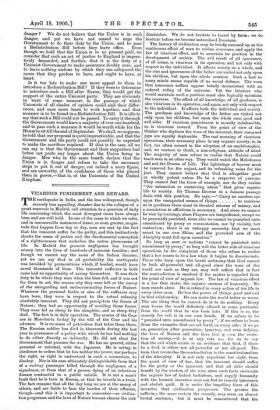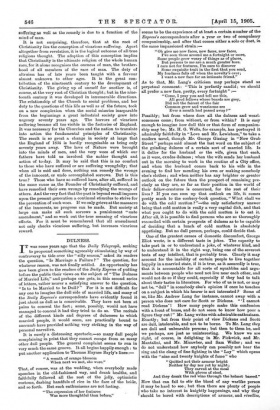VICARIOUS PUNISHMENT AND REWARD. T HE earthquake in India, and the
less widespread, though scarcely less appalling, disaster due to the collapse of a great reservoir in Madrid, call attention to a question of daily life concerning which the most divergent views have always been and are still held. In one of the cases to which we refer, and in innumerable instances of lesser, or even greater, magni- tude that happen from day to day, men are met by the fact that the innocent suffer for the guilty, and this instinctively shocks the sense of justice and the fundamental conception of a righteousness that underlies the entire phenomena of life. In Madrid the grossest negligence has brought misery into the lives of hundreds of innocent families ; and though we cannot say the same of the Indian disaster, yet we can say that in all probability the earthquake was heralded by premonitions' which, if heeded, would have saved thousands of lives. The innocent sufferers in both cases had no opportunity of saving themselves. It was their duty to be where they were when the blow fell, and it was not for them to ask the reason why they were left at the mercy of the unregarding and undiscriminating forces of Nature. Whatever the personal faults or sins of the sufferers may have been, they were in respect to the actual calamity absolutely innocent. They did not precipitate the forces of Nature ; they had no opportunity of avoiding those forces. They were led as sheep to the slaughter, and as sheep they died. The fact is in daily operation. The armies of the Czar are in Manchuria to-day by the will of the Czar and his advisers. It is no sense of patriotism that takes them there. The Russian soldier has died in thousands during the last year in pursuance of a policy with which he has had nothing to do either directly or indirectly. He did not elect the Government that pursues the war. He has no quarrel, either personal or national, with the Japanese. He is acting in obedience to orders that he has neither the power, nor perhaps the right, as right is understood in such a connection, to disobey. Nbr is his case ultimately distinguishable from that of a railway passenger killed through the negligence of a signalman, or from that of a person dying of an infectious disease contracted in a public vehicle. It is not a man's fault that he is born in Russia, or that he travels in a train. The fact remains that all the day long we are at the mercy of others, and are liable to bear the burden of their, offences, though—and this it is important to remember—as civilisa- tion progresses and the laws of Nature become clearer the risk diminishes. We do not hesitate to travel by train: we do hesitate before we become naturalised Russians.
The history of civilisation may be briefly summed up as the continuous effort of man to realise, overcome, and apply the law of vicarious effect, and to ascertain its position in the development of society. The evil result of all ignorance, of all crime, is vicarious in its operation, and not only with respect to the individual. It affects society as a whole, and the sins and ignorances of the father are visited not only upon his children, but upon the whole creation. Such a fact to many minds seems capable of no moral defence. The woes
that innocence suffers appear totally inconsistent with an ordered ruling of the universe. Yet the thinkers who would maintain such a position must also logically maintain the converse. The effect of all knowledge, of all goodness, is also vicarious in its operation, and again, not only with respect to the individual. It affects both the individual and society. The goodness and knowledge of the father are visited not only upon his children, but upon the whole race, good and
evil alike. If vicarious punishment is morally indefensible, so is vicarious reward. From the point of view of the thinker who deplores the woes of the innocent, their unearned joys are equally deplorable. The real meaning of vicarious operations, their necessary place in any organic society, is, in fact, too often missed in the adoption of an unphilosophic, and, we venture to think, a non-religious, attitude of mind. The majority of men refuse to realise that Nature could teach man in no other way. They would watch the Melodrama and not the Drama of Life. The lightnings of heaven must be reserved for the unjust, and its refreshing rains for the just. They cannot believe that God is altogether good or wholly potent unless He be a respecter of persons.
They cannot feel the force of example, nor do they realise " the catenation or conserving union " that gives organic life to society. Sir Thomas Browne in a famous passage deals with this position. He says :—" Carry no careless eye upon the unexpected scenes of things to continue us in goodness there must be iterated returns of misery, and a circulation in afflictions is necessary. And since we cannot be wise by warnings, since Plagues are insignificant, except we be personally punished, since also we cannot be punished unto amendment by proxy or commutation, nor by vicinity, but contaction; there is an unhappy necessity that we must smart in our own Skins, and the provoked arm of the Almighty must fall upon ourselves."
So long as men or nations "cannot be punished unto amendment by proxy," so long will the bitter side of vicarious operations be the complaint of those who refuse to realise that a law ceases to be a law when it begins to discriminate. Those who harp upon the harsh antinomy that God cannot be both all-powerful and all-good since the woes of the world are such as they are, may well reflect that in fact the contradiction is resolved if the matter is regarded from the point of view of organic law. The law of vicarious effect
is a law that states the organic oneness of humanity. No man stands alone. He is related in every action of his life to
every other man. He has the power of things good and evil in that relationship. He can make the world better or worse. The one thing that he cannot do is to do nothing. Every man leaves the world definitely altered in some particular from the world that he was born into. If this is so, the remedy for evil is in our own hands. If we refuse to be
" punished unto amendment by proxy "; if we refuse to learn from the examples that are set forth on every side ; if we go on, generation after generation, ignoring, and even defying, the laws of Nature and the laws that g ,vern the evolu-
tion of society,—it is at any rate not. for us to say that the evil which exists is an evidence that God, if there be a God, is either not all-powerful or not all-good. The term that reconciles the contradiction is the constitutionalism of the Almighty. It is not only expedient but right, from the point of view of law, that the innocent should suffer for the guilty or the ignorant, and that all alike should benefit by the wisdom of the wise, since such facts enunciate the organic law of linked battalions, and supply humanity with the keenest incentive man can feel to remedy ignorance and abolish guilt. It is under the impelling force of this
incentive that civilisation progresses. The greater the suffering, the more certain the remedy, may seem an almost brutal sentence; but it must be remembered that the
Buffering as well as the remedy is due to a function of the mind of man.
It is not surprising, therefore, that at the root of Christianity lies the conception of vicarious suffering. Apart altogether from revelation, it is the logical outcome of all true religious thought. The adoption of this conception implies that Christianity is the ultimate religion of the whole human race, for it alone recognises the oneness of man, the brother- hood of all members of the race of man. The duty of altruism has of late years been taught with a fervour almost unknown to other ages. It is the great con- tribution of the nineteenth century to the development of Christianity. The giving up of oneself for another is, of course, at the very root of Christian thought ; but in the nine- teenth century it was developed in innumerable directions. The relationship of the Church to social problems, and her duty to the questions of this life as well as of the future, took on a new complexion when the social miseries inseparable from the beginnings a great industrial society grew into urgency seventy years ago. The horrors of vicarious suffering became all too visible in the factories of England. It was necessary for the Churches and the nation to translate into action the fundamental principles of Christianity. The result is so great a change in society at large that the England of 1834 is hardly recognisable as being only seventy years away. The laws of Nature were brought into the minds of men, and the very woes of which our fathers have told us involved the nobler thought and action of to-day. It may be said that this is no comfort to those who have suffered or are suffering wrongfully; that when all is said and done, nothing can remedy the wrongs of the innocent, or undo accomplished sorrows. But is this true ? Those who have so suffered have, after all, suffered in the same cause as-the Founder of Christianity suffered, and have remedied their own wrongs by remedying the wrongs of others. And the very fact that the past is beyond recall imposes upon the present generation a continual stimulus to strive for the prevention of such woes. If we only grieve at the massacre of the innocents, no progress can be made. But society at large can make all such sorrows a punishment " unto amendment," and so work out the true meaning of vicarious effects. For it must be remembered that all amendment not only checks vicarious suffering, but increases vicarious reward.











































 Previous page
Previous page